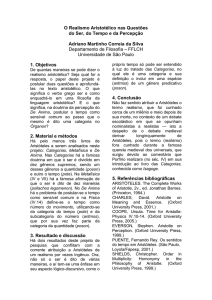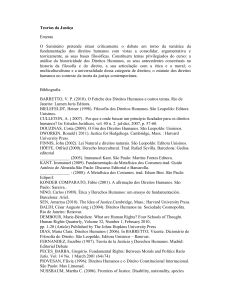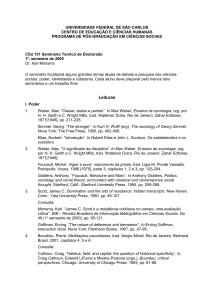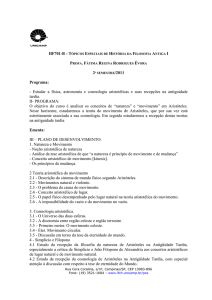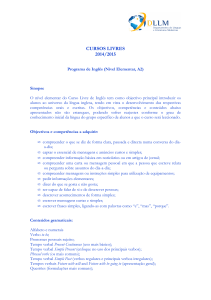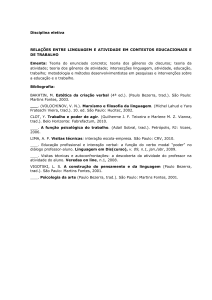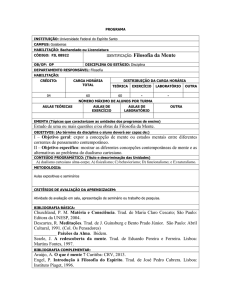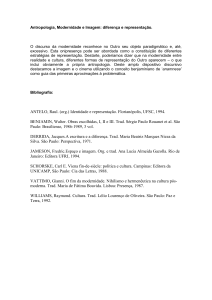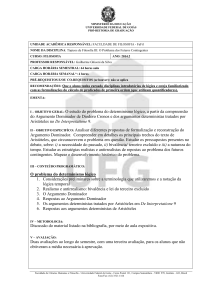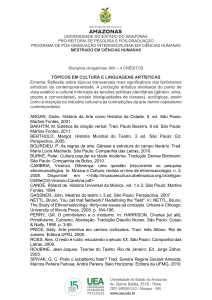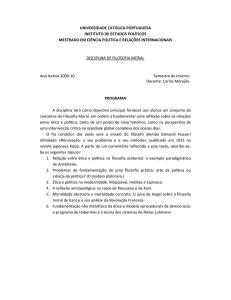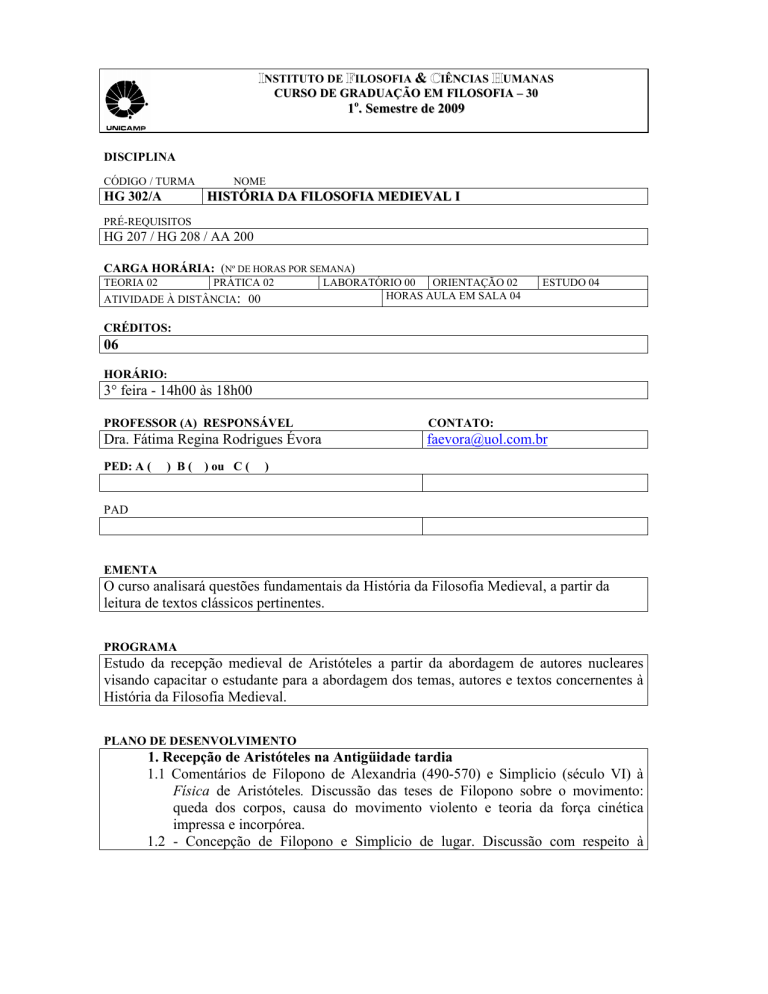
ILOSOFIA & IÊNCIAS UMANAS
CURSO DE GRADUAÇÃO EM FILOSOFIA – 30
NSTITUTO DE
1o. Semestre de 2009
DISCIPLINA
CÓDIGO / TURMA
HG 302/A
NOME
HISTÓRIA DA FILOSOFIA MEDIEVAL I
PRÉ-REQUISITOS
HG 207 / HG 208 / AA 200
CARGA HORÁRIA: (Nº DE HORAS POR SEMANA)
TEORIA 02
PRÁTICA 02
ATIVIDADE À DISTÂNCIA: 00
LABORATÓRIO 00
ORIENTAÇÃO 02
HORAS AULA EM SALA 04
ESTUDO 04
CRÉDITOS:
06
HORÁRIO:
3° feira - 14h00 às 18h00
PROFESSOR (A) RESPONSÁVEL
CONTATO:
Dra. Fátima Regina Rodrigues Évora
[email protected]
PED: A (
) B(
) ou C (
)
PAD
EMENTA
O curso analisará questões fundamentais da História da Filosofia Medieval, a partir da
leitura de textos clássicos pertinentes.
PROGRAMA
Estudo da recepção medieval de Aristóteles a partir da abordagem de autores nucleares
visando capacitar o estudante para a abordagem dos temas, autores e textos concernentes à
História da Filosofia Medieval.
PLANO DE DESENVOLVIMENTO
1. Recepção de Aristóteles na Antigüidade tardia
1.1 Comentários de Filopono de Alexandria (490-570) e Simplicio (século VI) à
Física de Aristóteles. Discussão das teses de Filopono sobre o movimento:
queda dos corpos, causa do movimento violento e teoria da força cinética
impressa e incorpórea.
1.2 - Concepção de Filopono e Simplicio de lugar. Discussão com respeito à
possibilidade do vazio e do movimento finito e temporal em um meio sem
resistência.
1.3 - Discussão sobre a Eternidade do Mundo na Antigüidade Tardia: Filopono e
Simplicio. Discussão do argumento da impossibilidade do infinito por
sucessão.
1.4 - Onipotência e liberdade divina associada à discussão de eternidade e unicidade
do mundo.
Comentadores árabes
2.1
2.2
2.3
Comentários árabes à Física de Aristóteles: Avicena (Ibn-Sina, 980-1037),
Avempace (Ibn-Badja, 1106-1138) e Averróis (Ibn-Roschd, 1126-1198).
Discussão sobre a eternidade do mundo: tese emanacionista aviceniana,
Defesa de Averröes da doutrina da eternidade do mundo. Refutação do
argumento da impossibilidade do infinito por sucessão.
3 Tomas de Aquino (1225-1274)
3.1 - Comentário de São Tomás à teoria aristotélica do movimento
3.1.1 Discussão com respeito ao movimento natural e violento
3.1.2 Possibilidade do movimento finito em um vazio hipotético. Argumento da
distantia terminorum
3.1.3 – Questão da causa do movimento
3.2 - O problema da eternidade do mundo em Tomás de Aquino e de sua teoria da
causalidade divina.
3.3 – Matéria e movimento celeste. Causa do movimento dos corpos celestes.
4
A condenação do aristotelismo em 1277.
4.1 Os acontecimentos que precederam à condenação de 1277 e o averroismo latino.
4.2 O decreto de Etienne Tempier condenando 219 proposições e argumentos
deterministas extraídos da (ou baseados na) filosofia aristotélica.
4.3 A condenação de 1277.
4.4 Discussão da teses com respeito à unicidade e eternidade do mundo
5
Recepção da física aristotélica no século XIV
5.1
Thomas Bradwardine (1290-1349): discussões sobre o infinito, contínuo e a
eternidade do mundo.
5.2 Teoria do impetus dos nominalistas de Paris, Jean Buridan (1300-1358) e
Nicolas Oresme (1320-1382).
5.2.1 O significado da teoria do impetus para a filosofia natural escolástica.
5.2.2 A teoria do impetus do movimento de projéteis
5.2.3 Sobre a causa da aceleração da queda dos corpos.
5.2.4 Representação matemática do movimento.
6 - A distinção entre potentia dei absoluta e potentia dei ordinata associada à
discussão de unicidade e eternidade do mundo.
III - MÉTODOS UTILIZADOS:
Aulas expositivas e seminários.
IV - ATIVIDADES DISCENTES:
Realização das leituras programadas e seminários.
V - CRITÉRIOS DE AVALIAÇÃO:
Seminários e trabalho escrito a ser entregue no final do semestre.
Realização das leituras programadas e seminários.
BIBLIOGRAFIA
1. FILOPONO E SIMPLICIO
PHILOPONUS, J., Against Aristotle on the Eternity of the World. trad. de Christian Wildberg.
New York: Cornell University Press, 1987. (De aeternitate mundi contra
Aristotelem).
____________, On Aristotle Physica 2. Trad. de A. R. Lacey. London: Duckworth & Co.
Ltd., 1993. (Ancient Commentators on Aristotle. SORABJI, R.(ed.)).
____________, On Aristotle Physica 3. Trad. de M. J. Edwards. London: Duckworth & Co.
Ltd.,1994. (Ancient Commentators on Aristotle. SORABJI, R.(ed.)).
___________, On Aristotle Physica 5-8; with SIMPLICIUS, On Aristotle on the void. Trad.
de Paul Lettinck & J. Urmson. London: Duckworth & Co. Ltd., 1994.
(Ancient
Commentators on Aristotle. SORABJI,
R.(ed.)).
____________, Place, Void, and Eternity. Philoponus: Corollaries on Place and Void .
trad de David Furley, with SIMPLICIUS, Simplicius: Against Philoponus on
the Eternity of the World. trad. de Christian Wildberg. New York: Cornell
University Press, 1991. Ancient Commentators on Aristotle. SORABJI,
R.(ed.)).
___________, Against Proclus' On the Eternity of the World 1-5 (Ancient Commentators
on Aristotle), Michael John Share (Translator), Cornell University Press
2005.
___________, Against Proclus' On the Eternity of the World 6-8 (Ancient Commentators
on Aristotle), Michael John Share (Translator). Publisher: Cornell University
Press, 2005.
___________, Against Proclus' on the Eternity of the World 12-18 (Ancient Commentators
on Aristotle) (Hardcover), Michael Share (Translator), Cornell University
Press 2006..
SIMPLICIUS, On Aristotle's Physics 6. Trad. de David Konstan. New York: Cornell
University Press, 1989.
__________, On Aristotle Physica 7. Trad. de Charles Hagen. London: Duckworth & Co.
Ltd., 1994. (Ancient Commentators on Aristotle. SORABJI, R.(ed.)).
__________, On Aristotle on the void. in PHILOPONUS, On Aristotle Physica 5-8; with
SIMPLICIUS, On Aristotle on the void. Trad. de Paul Lettinck & J. Urmson.
London: Duckworth & Co. Ltd., 1994. (Ancient Commentators on Aristotle.
SORABJI, R.(ed.)).
__________, Corollaries on Place and Time . Trad de J. O Urmson. New York: Cornell
University Press, 1992. (Ancient Commentators on Aristotle. SORABJI,
R.(ed.)).
Comentários:
ÉVORA, F. R. R., A revolução copernicano-galileana: Astronomia e cosmologia prégalileana. Campinas: Centro de Lógica, Epistemologia e História da Ciência,
v.1, 1988.
____________, A revolução copernicano-galileana: A revolução galileana. Campinas:
Centro de Lógica, Epistemologia e História das Ciência, v.2, 1988.
____________, Filopono e Descartes: Conceito de Extensão Material. Analytica, v.2, n.2,
1997, p. 83-104.
____________, Filopono e a crítica ao conceito de matéria prima. Cadernos de História e
Filosofia da Ciência, v.10, n.1, 2000, p. 55-76.
____________, A crítica de Filopono de Alexandria à tese aristotélica de eternidade do
mundo. Analytica, v.7, n.1, 2003. p. 15-47.
_______________, “Natureza e Movimento: um estudo da física e cosmologia aristotélica”.
Cadernos de História e Filosofia das Ciências Campinas, v.15, n.1, p. 127170, 2005.
_______________, “Discussão acerca do papel físico do lugar natural na teoria aristotélica
do movimento”. Cadernos de História e Filosofia das Ciências Campinas,
v.16, n.2, 2006.
FELDMAN. Philoponus on the Metaphysics of Creation. In: Link-Salinger (Ed.). A Straight
Path: Studies in Medieval Philosophy and Culture, Essays in Honor of Arthur Hyman,
The Catholic University of America Press, Washington, 1988: 74-85.
HOFFMANN. Simplicius's Polemics: Some aspects of simplicius' Polemical writings against
John Philoponus: from invenctive to a reaffirmation of the transcendency of
the heavesn. In: SORABJI (Ed.). Philoponus and the Rejection of Aristotelian
Science, Cornell University Press, 1987: 57-83.
JUDSON. God or Nature? Philoponus on Generability and Perishability. In: SORABJI (Ed.).
Philoponus and the Rejection of Aristotelian Science, Cornell University
Press, 1987: 179-196.
SAMBURSKY, S., The Physical World of Late Antiquity. London: Rouledge & Kegan
Paul, 1987.
___________,Philoponus’ interpretation of Aristotle’s theory of light. Osiris, vol. 13, 1958:
114-126.
SCHMITT, C., Philoponus' Commentary on Aristotle's Physics in the Sixteenth Century.
In: SORABY, R. (ed.), Philoponus and the rejection of Aristolian science.
New York: Cornell University Press, 1987.
SEDDLEY. Philoponus’ Conception of Space, Philoponus and the Rejection of Aristoteliam
Sciences, edit. R. SORABJI, Cornell University Press, 1987: 140-153.
SORABJI, R. (ed.), Philoponus and the rejection of Aristolian science. New York: Cornell
University Press, 1987.
___________,Infinity and the Creation. In: SORABJI (Ed.). Philoponus and the Rejection of
Aristotelian Science, Cornell University Press, 1987: 164-178.
__________, Matter, Space and Motion: theories in Antiquity and Their Sequel. London:
Duckworth & Co. Ltd., 1988.
WILDBERG, C., Prolegomena to the Study of Philoponus' contra Aristotelem. In:
SORABY, R. (ed.), Philoponus and the rejection of Aristolian science. New
York: Cornell University Press, 1987.
2
AVERRÖES
AVERROES. Compêndio de Metafísica (Edición bilingue). Trad. Carlos Quirós Rodriguéz,
Sevilla: Universidad de Córdoba, Málaga, Sevilla e Fundación El Monte, 1998
(VIII Centenário Averroes, 1198-1998).
__________, De Substantia Orbis. Critical Editon of the Hebrew Text with English
Translation and Commentary by Arthur Hyman, The Medieval Academy of
America and The Israel Academy of Sciences and Humanities,
Cambridge/Jerusalem, 1986.
__________,. Epitome de Física, trad. del arabe y estudio Josep Puig, Corpus Philosophorum
Medii Aevi Corpus Commentariorum Averrois in Aristetelem, Versio
Hispanica, voluninis a xx, Consejo Superior de Investigaciones Cientificas,
Instituto Hispano-Arabe de Cultura, Madrid, 1987.
__________, Books os Questions in Physics. In: GOLDSTEIN, H. T. (Ed.) Averröes'Qustions
in Physics. London: kluwer Academic Publ. 1991
__________,. Grand Commentaire de la Metaphisique d'Aristotle, Livre Lam-Lambda.
Traduit de l'arabe et annoté par Aubert Martin, Paris: Belles Lettres, 1984.
__________,Grand Commentary de la Methaphysique d’ Aristotle (Tafsir Ma Ba’d AtTabiat), Bibliotheca Arabica Acholasticorum, Série Arabe, Tome V, Texte
Arabe Inédit Établi par Maurice Bouyges, S. J., 4 volumes, 4 éme edition, 1992,
Dar el-Machreq Publishers, Beirut, 1986.
__________,. Questions in Physics, trad. Helen T. Goldstein, Kluwer Academic Publishing,
1990.
__________,. Grand commentaire de la Methaphysique, livre beta. Trad, introd et notes
Baouile. Paris: Vrin, 2000. FURLEY. Summary of Philoponus' Corollaries on
Place and Void. In: SORABJI (Ed.). Philoponus and the Rejection of
Aristotelian Science, Cornell University Press, 1987: 130-139.
SOBRE OS AUTORES ÁRABES
DAVIDSON. John Philoponus as a source of medieval islamic and jewish proofs of creation.
Journal of the American Oriental Society 89, 2, 1969: 357- 391.
________, Proofs for Eternity, Creation and the Existence of god in Medieval Islamic and
Jewish Philosophy. Oxford: Oxford University Press, 1987.
DAVIS. Modality and Eternity: Averroes on the Eternity of the World. Lyceum VI, 2, 1994.
FAKHRY. The "antinomy" of eternity of the world in Averroes, Maimonides and Aquinas.
Museon 66,, 1953: 139-155. Publicado também em: Fakhry, Majid. Philosophy, dogma
and the impact of greek tought in Islam. Brookfield: Ashgate Publishing Limited, 1994,
(article XV).
GILSON, É., Pourquoi saint Thomas a critique saint Augustin; Avicenne et le point de depart
de Duns Scot. Paris, Vrin, 1986.
HOUSER. Avicenna, aliqui, and the thomistic doctrine of creation. http://www. stthom.
edu/houser/avicenna2000. pdf. Acesso em 32-07-2003.
LIBERA, A.
DE,
Filosofia Medieval. Trad. D. D. Machado e N. Campanário. São Paulo,
Loyola, 1998.
VERZA, T. M. . O argumento da pluralidade dos mundos no Tahafut al-tahafut de
Averróis. Cadernos de História e Filosofia das Ciências, Campinas, v. 16, n.
2, p. 15-32, 2006.
STORCK, A. ‘‘Eternidade, possibilidade e indiferença: Henrique de Gand leitor de
Avicena’’, in Analytica, v. 9/1 (2005), p. 137-152
__________, ‘‘A constituição das substâncias materiais e a acidentalidade da existência.
Observações acerca da ontologia e da semântica avicenianas’’,Cadernos de
História e Filosofia da Ciência, v. 15/2 (2005) p. 313-342
3 TOMAS DE AQUINO
TOMÁS DE AQUINO,
De eternitate mundi, édition Léonine, «Opera Omnia» XLIII, Rome,
1976.
______________, On the Eternity of the World. Trad. by Cyril Vollert. In: On the Eternity of
the World. Milwaukee: Marquette University Press, 1984.
________________, Sobre a eternidade do mundo. Trad. e notas J. M. Costa Macedo.
Medievalia 9, 1996
_____________, Suma Teológica. vol. 1, caps. 44-46. Trad. A. Corrêa. Porto Alegre:
Sulina, UCS, 1980.
_____________, Commentary on Aristotle Physics, book 8, lecture 1-4. Trad. Blackwell,
Spath, and Thirlkel. New Haven: Yale University Press, 1963.
_____________, Compendium of Theology I, Caps. 95-100. Trad. Vollert. London; B.
Herder Book, 1952.
______________, Suma contra os gentios, vol. 1, caps 31-38. Trad. Odilão Moura. Porto
Alegre: EST, Sulinas, UCS, 1990
Introdutório:
GARDEIL, H. D., Iniciação à Filosofia de Sto. Tomás de Aquino. Vol. I: Lógica; vol. II:
Cosmologia: vol. III: Psicologia; vol. IV: Metafísica. Trad. P. Arantes et.
al. São Paulo, Duas Cidades, 1967.
KRETZMANN, N., & STUMP, E., edd., The Cambridge Companion to Aquinas. Cambridge,
University Press, 1993.
Comentários:
BERTOLA. Tommaso D’Aquino e il problema dell’eternitá del mondo. Rivista di Filosofia
Neo-Scolastica 66, 1974: 312-355.
BUKOWSKI. An Early Dating for Aquinas' De aeternitate mundi, Gregorianum 51 (1970):
277-9.
CARROLL. Aquinas on Creation and the Metaphysical Foundations of Science.
http://www2.nd.edu/Departments//Maritain/ti98/carroll.htm
CHENU, M-D., Introduction a l’étude de saint Thomas d’Aquin. Montréal, Institut d’études
médiévales / Paris, Vrin, 1974.
DALES, R. C. Discussions of the eternity of the world during the first half of the twelfth
century. Speculum 57, n. 3, 1982: 495-508.
DALES, R. C. Time and eternity in the thirteenth century. Journal of the History of Ideas
49, n. 1, 1988: 27-45.
DALES, Richard. Medieval Discussions of the Eternity of the World. Leiden: E. J. Brill,
1990.
DEWAN. Thomas Aquinas, Creation, and two Historians. Laval théologique et philsophique
50 (1994) 363-387.
FOREST, A., La Structure métaphysique du concret selon saint Thomas d'Aquin. Paris, Vrin,
1931.
GILSON, É., A Existência na Filosofia de Santo Tomás. São Paulo, Duas Cidades, 1965.
_________, Le thomisme: introduction a la philosophie de saint Thomas d’Aquin. Paris,
Vrin, 1965.
_________, El Tomismo. Introducción a la Filosofía de Santo Tomás de Aquino. Trad. A.
O. Quierno. Buenos Aires, Desclée, de Reouwer, 1951.
JOHNSON, Did St. Thomas Attribute a Doctrine of Creation to Aristotle? New Scholasticism
63 (1989) 129-155
KRETZMANN, Norman. The metaphysics of creation: Aquinas natural theology in Summa
contra gentiles II. Oxford: Clarendon Press, 1999.
LANDIN, Raul, “Abstração e Juízo: observação sobre as noções de ente e de ser em Tomás
de Aquino”. In: EVORA, F.; FARIA; P. SANTOS, L. H. L.; ZINGANO, M.
“lógica e Ontologia: Ensaios em homenagem a Balthazar Barbosa Filho.”
São Paulo: Discurso Editorial, 2004
GEIGER, L. , Abstraction et séparation d’ après S.Tomas. Philosophie et Spiritualité.
Paris: Cerf, 1962, p. 87-124.
MICHON, C., Thomas d'Aquin et la controverse sur l'éternité du monde, Paris, GarnierFlammarion, 2004.
PEGIS. A note on St. Thomas Summa Theologica I, 44, 1-2. Medieval Studies 8, 1946: 159168.
SCHNEIDER. The Eternity of the World: Thomas Aquinas and Boethius of Dacia. Archives
d'histoire doctrinale et littéraire du moyen age 66, 1999: 121-141.
STORCK, A. C., Ser e unidade segundo Santo Tomás de Aquino. Mestrado, UFRGS, 1997.
_________, “A noção de indivíduo segundo Santo Tomás de Aquino”, Analytica, Rio,
III(2), pp. 13-54.
_________, ‘’Eternidade, possibilidade e emanação. Gilherme de Auvergne e Tomás de
Aquino leitores de Aristóteles’’, in Analytica, 7/1 (2003), p. 113-150
_________, “Deus autem et natura nihil frustra faciunt”: Notas sobre a teleologia nos
comentários de Tomás de Aquino a Aristóteles’’, Cadernos de História e Filosofia
da Ciência, série 3, v. 16, n. 2, (2006).
WIPPEL. Did thomas Aquinas Defend the Possibility of an Eternally Created World.
Journal of the History of Philosophy 19, 1981: 21-37
4 Bradwardine, Buridan e Oresme
BRADWARDINE, T. De motu incerti auctoris. In: CLAGETT, Marshall. Science of
Mechanics in the Middle Ages. Madison: The University of Wisconsin
Press, 1979.
__________,. Le De futuris contingentibus de Thomas Bradwardine. Recherches
augustiniennes, 14, 1979.
__________,Le De futuris contingentibus de Thomas Bradwardine. Ed. M. Jean-François
Genest. Recherches augustiniennes, 14, 1979: p. 249-336.
__________,, T. Le traité “De continuo” de Bradwardine. Paris, 1960.
__________, On the continuum, definitions 1-3, 7-14, 23-24, suppositions 6-9, conclusions
22-24, 26. In: CLAGETT, Marshall. Science of Mechanics in the Middle Ages.
Madison: The University of Wisconsin Press, 1979.
BURIDAN, I., Questiones super octo physicorum libros Aristotelis. Paris, 1509 (MSS
Paris: B N lat I 4723, ff. 2r-107o; Carpentras 293; Vat. lat. 2I63, ff. Ir-I57 v,
e 2I64, ff. Ir-I20r), livro VIII, questão 12. Trad. de M. Clagett. In:
CLAGETT, M., The science mechanics in the middle age. 3.ed. Madison:
University of Wisconsin, 1979, p.532-40.
BURIDAN, I., Questiones super octo physicorum libros Aristotelis. Paris, 1509 (MSS
Paris: B N lat I 4723, ff. 2r-107o; Carpentras 293; Vat. lat. 2I63, ff. Ir-I57 v,
e 2I64, ff. Ir-I20r), livro VIII, questão 12. Trad. de M. Clagett. In:
CLAGETT, M., The science mechanics in the middle age. 3.ed. Madison:
University of Wisconsin, 1979, p.532-40.
ORESME, N, Le livre du ciel et du monde. Ed. By A D. Menut and A J. denomy. Trad. de
A D. Menut. Madison: University of Wisconsin, 1968.
__________, Deproportionibus proportionum and Ad pauca respicients. Ed. E trad. E.
Grant. Madison: University of Wisconsin, 1966
Comentários:
CLAGETT, M. THE science of mechanics in the middle ages. Madison: University of
Wisconsin Press, 1979
CUSTÓDIO, M. A. D. . Teoria das Proporções e Unificação das Ciências em Bradwardine.
Cadernos de História e Filosofia da Ciência, v. 16, p. 18-39, 2006.
___________________, Representação Matemática e Crítica às Teorias Indivisibilistas em
Thomas Bradwardine. Cadernos de História e Filosofia da Ciência, v.
15, p. 457-491, 2005.
GRANT, E., Much Ado About Nothing. Cambridge: Cambridge, 1981.
____________, Source book in the medieval science. Cambridge: Harvard University, 1974
MICHON, C., Nominalisme. La théorie de la signification d’Occam. Paris, Vrin, 1994.
PANACCIO, C., Le discours intérieur: de Platon à Guillaume de Ockham. Paris, Seuil, 1999.
5 GERAL
CLAGETT, M. THE science of mechanics in the middle ages. Madison: University of
Wisconsin Press, 1979
DALES, R. Medieval Discussions of the Eternity of the World. Leiden: E. J. Brill, 1990.
______, Discussions of the eternity of the world during the first half of the twelfth century.
Speculum, vol. 57, n. 3, 1982: 495-508.
______, Robert Grossetest's place in medieval discussions of the eternity of the world.
Speculum 61, 3, 1986: 544-563.
______, Time and eternity in the thirteenth century. Journal of the History of Ideas 49, n. 1,
1988: 27-45.
DE RIJK, L.-M., La philosophie au Moyen Age. Leiden, Brill, 1985.
DE LIBERA, A, Pensar na Idade Média. Trad. Paulo Neves. São Paulo, editora 34, 1999
____________, L’art des généralités. Théories de l’abstration. Paris, Aubier, 1999.
DUHEM, P., Le Système du monde: histoire des doctrines cosmologique de Platon a
Copernic.Paris: Hermann, 1913-58, 10v.
EVANS, G. R., Philosophy and Theology in the Middle Ages. London and New York,
Routledge, 1993.
GILSON, É., A Filosofia na Idade Média. Trad. E. Brandão. São Paulo, Martins Fontes,
1995.
GRANT, E., Much Ado About Nothing. Cambridge: Cambridge, 1981.
____________, Source book in the medieval science. Cambridge: Harvard University,
1974.
WOLFSON. Patristic Arguments against the Eternity of the World, Studies in the History of
Philosophy and Religion, ed. Isadore Twersky and George H. Willians, vol. I,
Cambridge: Harward U. Press, 1973: 182-198.
FORMAS DE AVALIAÇÃO
HORÁRIO DE ATENDIMENTO A ALUNOS

